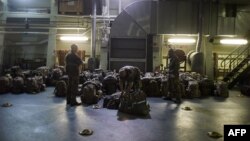The United Nations Security Council is expected to approve a resolution Thursday authorizing African and French troops to try to end the chaos in the Central African Republic.
Hours before the vote, heavy gunfire rang out in the country's capital in clashes between former rebels who toppled the president earlier this year and fighters loyal to the ousted leader.
Wilfred Koyamba, a student in the city, said people fear for their safety and wonder when help will arrive.
"The French army told us three or four days ago that they are on the border and waiting for the green light to come in, but up to now we haven't seen them, and that's what's bothering us, particularly given this situation now, everybody's afraid," said Koyamba.
The U.N. resolution would authorize an African Union-led force to restore security and for French troops to "take all necessary measures" to support them.
France has pledged to increase its presence in the country to about 1,000 troops, while the AU-led force is due to expand to 3,600 soldiers this month.
The measure also calls for U.N. chief Ban Ki-moon to recommend within three months whether or not to form a U.N. peacekeeping force, which he has said could involve up to 9,000 troops.
It also includes an arms embargo, and expresses concern about the rise in sectarian violence and the "total breakdown in law and order."
A group of rebels known as Seleka overthrew president Francois Bozize in March, and a weak interim government has been unable to exert control over the fighters.
Seleka has since been blamed for clashes with rival militias as well as a surge of murders, rapes, robberies and auto thefts.
The U.N. said Wednesday unidentified gunmen killed at least 12 civilians northwest of Bangui in an attack they said appeared to be Christian militias known as "anti-balaka" targeting mostly Muslim herders.
The U.N. said an adviser to interim President Michel Djotodia blamed supporters of Bozize for the attack.
Hours before the vote, heavy gunfire rang out in the country's capital in clashes between former rebels who toppled the president earlier this year and fighters loyal to the ousted leader.
Wilfred Koyamba, a student in the city, said people fear for their safety and wonder when help will arrive.
"The French army told us three or four days ago that they are on the border and waiting for the green light to come in, but up to now we haven't seen them, and that's what's bothering us, particularly given this situation now, everybody's afraid," said Koyamba.
The U.N. resolution would authorize an African Union-led force to restore security and for French troops to "take all necessary measures" to support them.
France has pledged to increase its presence in the country to about 1,000 troops, while the AU-led force is due to expand to 3,600 soldiers this month.
The measure also calls for U.N. chief Ban Ki-moon to recommend within three months whether or not to form a U.N. peacekeeping force, which he has said could involve up to 9,000 troops.
It also includes an arms embargo, and expresses concern about the rise in sectarian violence and the "total breakdown in law and order."
A group of rebels known as Seleka overthrew president Francois Bozize in March, and a weak interim government has been unable to exert control over the fighters.
Seleka has since been blamed for clashes with rival militias as well as a surge of murders, rapes, robberies and auto thefts.
The U.N. said Wednesday unidentified gunmen killed at least 12 civilians northwest of Bangui in an attack they said appeared to be Christian militias known as "anti-balaka" targeting mostly Muslim herders.
The U.N. said an adviser to interim President Michel Djotodia blamed supporters of Bozize for the attack.





